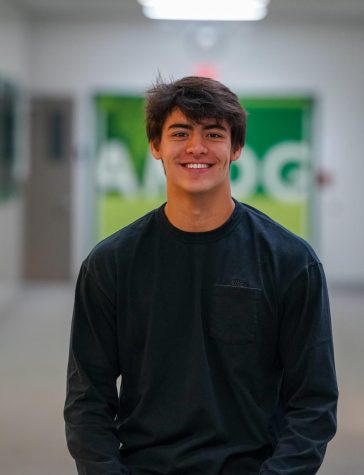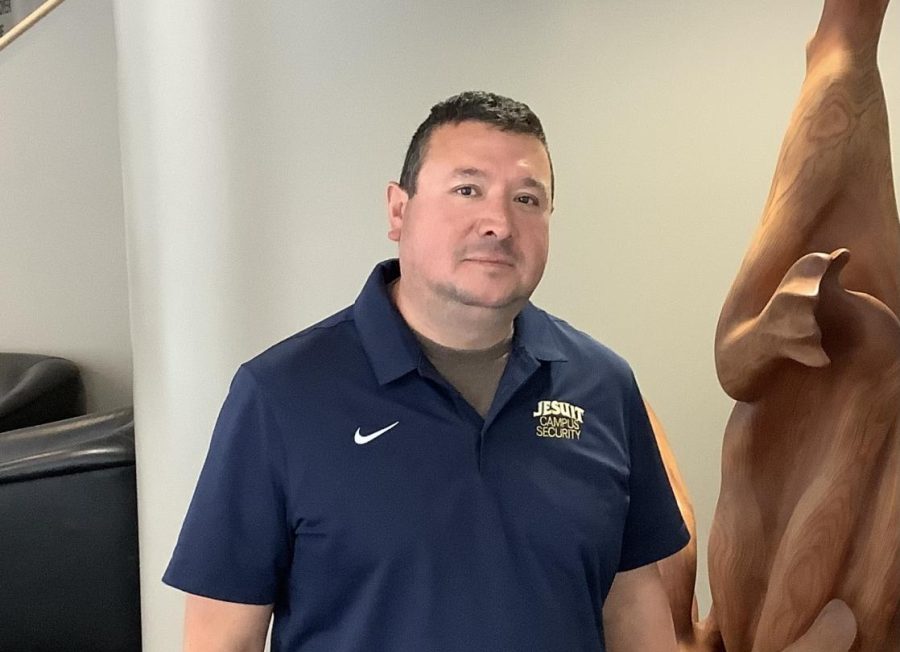New Staff Q&A: Mr. Martinez, Campus Monitor
Mr. Martinez, a first year campus monitor
Mr. Abraham Martinez is a new campus monitor as of 7 months ago. At Jesuit, Mr. Martinez will be responsible for student safety, staff safety, and visitor safety. He will also be responsible for making sure things go smoothly in the parking lot.
Mr. Martinez is excited to come to work everyday because of the energy that everyone on campus has.
“And I think that being around kind of young people, generally speaking, everyone is kind of energized and I think when you come to a place like a campus, what you have every day is kind of just like energy all day long,” Martinez said.
Prior to working at Jesuit, Mr. Martinez worked as a police sergeant in an open space agency, which was similar to the Forest Service. He ended up retiring from the force and moving to Portland after his wife was offered a new job opportunity. This gave him time to spend more time with his kids.
“I ended up coaching little league from 2015 to just last year, so I got a chance to do about six years of getting back into watching soccer games for my daughter and coaching baseball for my son. So that was a nice period to get re-engaged,” Martinez said.
Since starting at Jesuit, he hopes that more students will find him and his fellow campus monitors approachable. He hopes that if students help with anything, they feel comfortable to ask himself just like they would their counselors or other teachers.
Mr. Martinez also says that if there was some advice he would give to the students, it would be something that his brother told him in his own highschool days.
“The one thing he noticed and he just told me was, ‘I saw you when you go through the hallways, and have your head up. Not only just for perspective on what’s all going on around you, but it’s just kind of to be taking it all in,’” Martinez said.
Full Interview Transcript
And what is your name?
My name is Abraham Martinez.
And could you spell your last name for me?
M-A-R-T-I-N-E-Z
How long have you been in your field?
I’ve been a campus monitor for seven months.
Where did you work prior to Jesuit?
I was a police officer in Illinois, a police sergeant in an open space agency. I don’t know if they have them here, but it’s basically something kind of like the Forest Service. So the Forest Service would have a policing wing. A lot of times they kind of have similar uniforms. It’s that kind of small little goldish shield with the green uniforms and the tan except for police gear on and so they wouldn’t be the ticket takers at booths. They would be the game enforcement. You know, citation enforcement and whether it’s some public right aways and things like that. So they kind of do the law enforcement part of the management of an open space. So you’ve got site visitors that go to a wildland or something or a park or something like that. And then there’s the people that work in the facilities for different purposes. And then there’s the law enforcement part of it.
What are your main responsibilities at Jesuit?
Sure, it’s you know, like anything else has a job description. And then you’ve got all the bullet points that tell you all the different things that are the job duties, the responsibilities and the qualifications for it, but I would say like the long and short of it is going to be student safety, staff safety, site user/campus visitor safety, and then everything from after that is the tangential part, whether it’s like, the chewing of the gum and the parking or letting supervisory staff like my supervisor, Cathy Kent, let her know, hey, this an incident that we saw, and then she would either do the further part of the investigation for it or kind of come to the determination or the culmination of whether like a JUG or something else more serious is involved with that.
What excites you about your work at Jesuit?
I think going to, my work environment is basically the school and so my work environment has a population, right. And I think that being around kind of young people, generally speaking, everyone is kind of energized and I think when you come to like a place like a campus what you have every day is kind of just like energy all day long, because at any given day, there’s any amount of students that are either preparing for something like at the PAC, later on in the season, they’ll be coming up on kind of the their performance, or like students that are hyping themselves up to stay motivated for practice. Or maybe, you know, Thursday we’ve got varsity football, so there’s always kind of like, any given person at any given time has got kind of just this high energy of something that they’re attempting to accomplish that day.
What is something the community should know about you?
Something that the community should know about me. I don’t know. I mean for me I guess I’d like for people to know that I’m approachable and that, you know. There are so many first points of contact at this school for the things that a student is going through, whether it’s at the counseling office or their vice principals. You know it’s just an approachable first point of contact with whatever concerns someone may have, and then at that point they could be directed by myself or like Keith, for example, who is the other campus monitor because maybe they have an apprehension about not knowing where they should be able to go for something that’s in there current need.
What is the best piece of advice you’ve ever received?
I mean I don’t consider myself a young person anymore. And I think when you kind of get to be a little bit of an older person, you get so much good advice from different people, but I guess if I had to make it like high school relevant, I would say something to the effect of like when I was a freshman at my high school in Illinois. My brother was a senior. And so when you look at the school perspective, from a senior going through their everyday life, and a freshman, the one thing he noticed and he just told me was, I saw you when you go through the hallways and have your head up. Not only just for perspective on what’s all going on around you, but it’s just kind of to be taking it all in. So I think, if I had to say one piece of advice that maybe is relevant for this population, I would say just when you walk around, have an air about yourself about taking the world in, so having your head up.
And this is just a question that I wanted to ask, how did you end up in Portland from Illinois because my dad is from there?
Where are you from in Illinois?
I’m not personally, but my dad is from Decatur.
Oh okay. We came when I retired early from Illinois. I was a sergeant there. I was like, two three years on the job. I was like the youngest guy to get promoted from officer to sergeant. So I was working through and we were because we were a smaller agency. The sergeants were patrolling sergeants and so we were out there working cases as well. And at the same time, we would be doing the reviews and reports and all of that kind of stuff. When you get into policing, the first couple of years are very chaotic, because you’re just learning so much stuff. And then after about five or seven years, you finally get to get kind of in a nice groove, where you’re kind of at the ability where you’re either progressing in this field or like you know enough to kind of screw up. And if you make it past that then you get longevity. So then I was at about somewhere between my 15th and 16th year as police and loving it. And then we were on a work trip with my wife, who’s an attorney in Buenos Aires. And she was there on a conference. And then she said I’m not necessarily honored for some love and where I’m at. You know, what do you think about if I kind of like get shopped around a little bit with headhunters and she threw out a couple of different cities. And I said fine, you know, it made sense for the families. I have two kids. One of them’s here, Calvin’s a sophomore here. And then I said if it makes sense. I mean, I love my job, all that stuff is squared away, but like, if it gives us an opportunity to kind of like stay in a nice kind of growth trajectory where I get to be like a baseball coach. You know, because when you’re police you’re working nights, you’re working different shifts, second shift, swing shift, third shifts, and in addition, your days off are always rotating. So you end up missing a lot of things like, family grow up time, you know. So then I said, Yeah, let’s kind of give it a go. So then like, I mean, it must have been three to four months later, she’s like, well, I got a pretty good offer, but it’s in the Portland area. And then I said, well, let’s just do it. So I ended up giving my chief I think a six month heads up. And even as I left, I helped do the first stage of who they had to hire to be a patrol officer so someone else could get promoted to sergeant so we kind of keep it going. But basically that’s what brought me here. My wife had a good opportunity to come here and it made sense for us to do that. So then I pretty much had to do what they call “retire.” It was a procedural thing for federal stuff, so not that it matters in this setting, but it’s so that you could be an armed person without having to go through each state’s requirements. I’m federally because of my good standing in retirement of a certain amount of time as a police officer. I technically retired. So I’ve got all these credentials, and I’ve got all that stuff. So that was the move. I ended up coaching little league from 2015 to just last year, so I got a chance to do about six years of getting back into watching soccer games for my daughter and coaching baseball for my son. So that was a nice period to get re-engaged.




